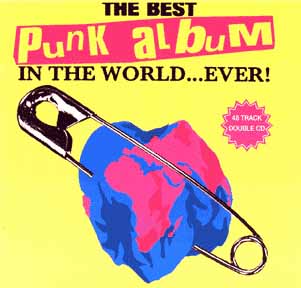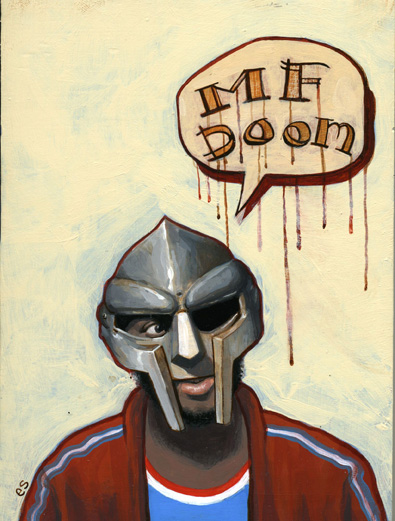
So what is/was the best punk album ever? It's a question that has been vexing precisely no-one, but Irk The Purists will endeavour to settle the non-existent debate once and for all.
Never Mind The Bollocks? Some great singles, obviously, and the inclusion of
Bodies puts it right up there, but there's also some filler (
Submission, anyone?). The Clash's first album? More of a contender, possibly, but still some duff tracks.
Another Music In A Different Kitchen? A good LP, but it missed the punk boat (it was released in 1978)...
Eater-The Album? Okay, now you're getting silly.
Really, the album's title should tip you off, but I can now reveal that the best punk album in the world, ever, is.....(drum roll, please...)
Fulham Fallout by The Lurkers! Oh no, hang on, there's been a steward's enquiry. No, it is in fact, the album pictured above, entitled
The Best Punk Album In The World...
Ever. Now notwithstanding the fact that the sleeve is like a GCSE art student's homage to
Jamie Reid, that the track information is scanty at best, and that most heinously, Virgin subsequently saw fit to release the oxymoronically titled
The Best Punk Album In The World...Ever 2 (which, to my mind, is right up there with the Stallone vehicle
First Blood II in the "shurely shome mishtake?" stakes), this 48-track double CD, released some 19 years after our parents fought the punk wars, really is the best document of the era.
Compilations like this usually feature approximately 33% good tunes, and 67% that are brought in to pad out the album to something that punters will pay £12 for at Christmas. So while
The Best Punk Album contains stone classics like
Identity by X-Ray Spex,
New Rose by The Damne, and Television's
Marquee Moon, you'd be within your rights to expect it to also contain making-up-the-numbers tracks by the likes of Splodgenessabounds, Sham 69 or the aforementioned Lurkers. You'd be wrong in this case, however. This compilation really does cover all the bases, from Richard Hell & The Voidoids'
Blank Generation to Jonathan Richman's
Roadrunner, from Buzzcocks to The Jam to The Undertones. Even when it does step outside its remit, bringing in post-punk from XTC, Talking Heads, PiL and Magazine, the songs are so strong you really have to cut it some slack. Quite honestly, this is all killer and no filler whatsoever. Even the less revered groups in the canon (e.g. Boomtown Rats, Stranglers) contribute their 'A' material (
Peaches,
Get a Grip On Yourself and
Lookin' After Number One). You can see the full track listing for the two CDs
here, and I dare you to disagree with the inclusion of any of the songs, even if many of them aren't strictly "punk". I think the fact that Virgin had its own vaults to plunder, along with those of EMI, explains the strength of the CD; they didn't have too many rights to negotiate. In fact, while the odd purist may cavil at the exclusion of, say, The Dead Kennedys, I think most would look at the track listing and say that the only real glaring omission is that of The Clash. CBS, The Clash's label, presumably didn't want to play ball on this one.
Not that The Clash are short on exposure at the moment. The increasingly cadaver-like Mick Jones is currently 50 per cent of
Carbon/Silicon, along with his old mucker Tony James (note to self-- a Sigue Sigue Sputnik post over the next few weeks...hmmm......), while
Paul Simonon teamed up with Damon Allbran at the turn of the year to some acclaim. However, it's
M.I.A. that's going to bring most attention to the Clash's back catalogue over the next few months, I suspect. Her new single,
Paper Planes, produced by Big Dada artiste
Diplo, samples "Straight To Hell" to startling effect, and rocks so hard that I'm prepared to break the unspoken credo of the MP3 blogger and make it available to you right now, even though it's not released as a single for another few weeks. I'm doing this in the hopes that everyone will fall in love with it, and then buy
Paper Planes, as well as
Kala, the album fr

om which it's taken. So don't make a fool of me. Think of it as a free sample, a bit like those small bottles of shampoo that sometimes come through your door. If you like it, buy it! As well as biting The Clash, another of
Kala's tracks,
Bamboo Banga, quotes from Jonathan Richman's
Roadrunner. Which is roughly where we came in. And so, as all those leather jackets used to proclaim circa 1983, punk's not dead. In fact, like zombies in a George Romero movie, it's roaming all over the shopping malls in the 21st century. And when the music it's engendering is as vital as M.I.A.'s
Kala, it'd be churlish to get too upset.
Download
Paper Planes by M.I.A.
(deleted May 2008) Buy Kala

 Download Show Biz Kids by Steely Dan (deleted May 2008)
Download Show Biz Kids by Steely Dan (deleted May 2008)







